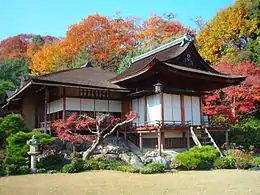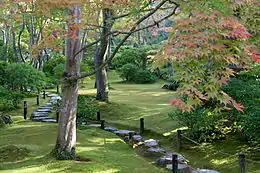Ōkōchi Sansō
Ōkōchi Sansō (大河内山荘, Ōkōchi Sansō, literally "Okochi Mountain Villa") is the former home and garden of the Japanese jidaigeki (period film) actor Denjirō Ōkōchi in Arashiyama, Kyoto. The villa is open to the public for an admission fee and is known for its gardens and views of the Kyoto area. Several of the buildings are recorded as cultural properties by the national government.

Location
Ōkōchi Sansō is on the slopes of Mt. Ogura behind Tenryūji Temple and next to Arashiyama Park and the Sagano bamboo grove in Ukyō-ku, Kyoto.
The closest regular train station (about a 15-minute walk) is Arashiyama on the Keifuku Electric Railroad Arashiyama Main Line. Torokko Arashiyama Station on the special Sagano Scenic Railway is even closer.
The villa

The grounds of the villa encompass approximately 2 hectares and feature multiple buildings, including a Japanese-style home, tea houses, and shrines, amidst carefully maintained Japanese gardens.[1] They were built up over a period of 30 years by Ōkōchi to function as one of his residences. They were opened to the public after his death in 1962. The main structures were built in the 1930s and 1940s except for the Jibutsudō, which is a Meiji Era building that was moved to this site.[2]
The gardens were designed to show off each of the four seasons.[1] Since the villa is on top of a hill, the city of Kyoto, Mt. Hiei, and the Hozu River gorge are well visible from points on the grounds.[1]
Facilities
Four of the structures on the grounds were recorded as tangible cultural properties (tōroku yūkei bunkazai) by the national government in 2003:
- Daijōkaku (the main house, known for boldly combining shoin-zukuri, sukiya-zukuri and other styles)[3]
- Jibutsudō (a Buddhist shrine, with irimoya style roof)[2]
- Tekisuian (a chashitsu, or tea house)[4]
- Chūmon (the middle gate)[5]
There is an open-air museum dedicated to Denjirō Ōkōchi and an observation platform. Matcha tea and a sweet are included in the price of admission and are available at the main tea house.
Gallery
 Chūmon (the middle gate)
Chūmon (the middle gate) Jibutsudō
Jibutsudō Tekisuian
Tekisuian Museum for Denjirō Ōkōchi
Museum for Denjirō Ōkōchi
References
- "Okochi Sanso Villa". Japan Visitor. Retrieved 12 November 2010.
- "Ōkōchi Sansō Jibutsudō". Kuni shitei bunkazai tō dētā bēsu (in Japanese). Agency for Cultural Affairs. Retrieved 13 November 2010.
- "Ōkōchi Sansō Daijōkaku". Kuni shitei bunkazai tō dētā bēsu (in Japanese). Agency for Cultural Affairs. Retrieved 13 November 2010.
- "Ōkōchi Sansō Tekisuian". Kuni shitei bunkazai tō dētā bēsu (in Japanese). Agency for Cultural Affairs. Retrieved 13 November 2010.
- "Ōkōchi Sansō Chūmon". Kuni shitei bunkazai tō dētā bēsu (in Japanese). Agency for Cultural Affairs. Retrieved 13 November 2010.
External links
- Kyoto Kankō Navi Introduction to Ōkōchi Sansō by Kyoto City (in Japanese)
| Wikimedia Commons has media related to Okochi Sanso. |
